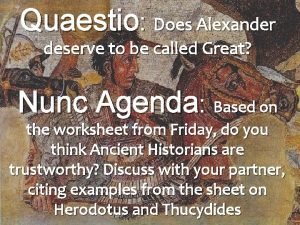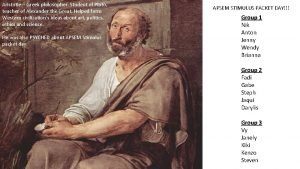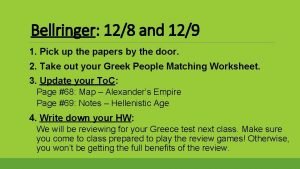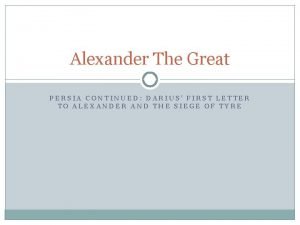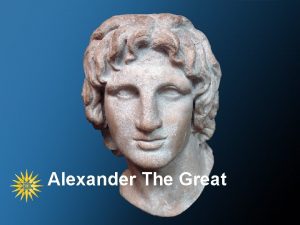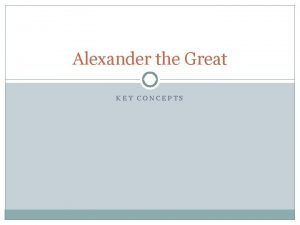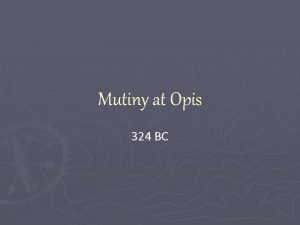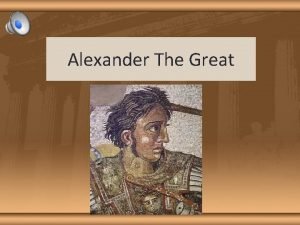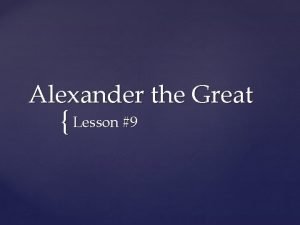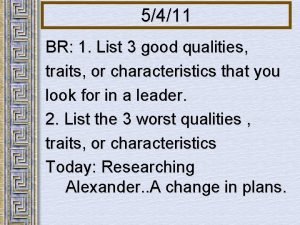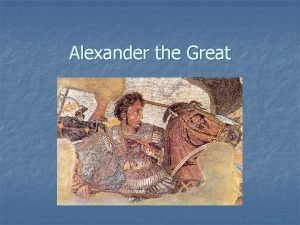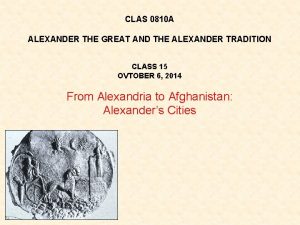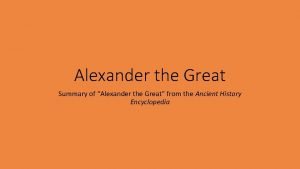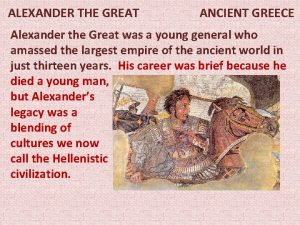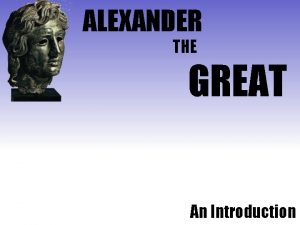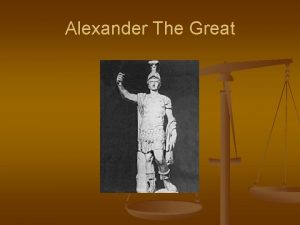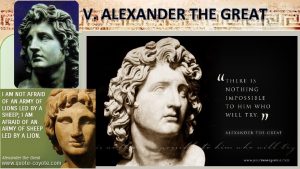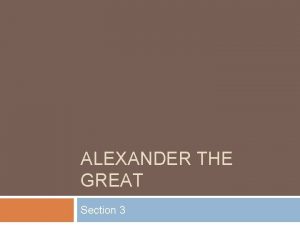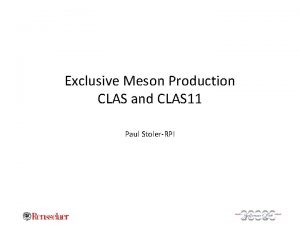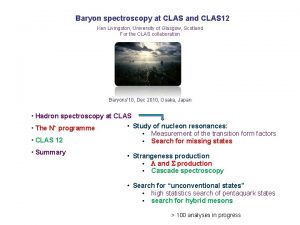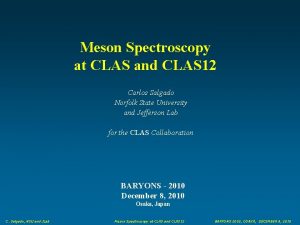CLAS 0810 A ALEXANDER THE GREAT AND THE
















- Slides: 16

CLAS 0810 A ALEXANDER THE GREAT AND THE ALEXANDER TRADITION CLASS 13 October 1, 2014 ARRIAN Who was he? How reliable a source on Alexander?

Pompeii, House of the Vettii 1 st century AD Painting of Alexander as Zeus, perhaps based on an original by Apelles

Pompeii, House of the Faun 1 st century BC The Alexander Mosaic Probably based on a large-scale painting by Philoxenos of Eretria, commissioned in 317/316 BC According to Pliny, it was taken to Macedonia, then Rome, in 168 BC Original painting now lost, but presumed to have been the source for this lavish mosaic (19 x 10 feet, one million tesserae)


French Alexander Romance manuscript, 1445 Greek 100 drachma coin, 1992 Andrea de Verrocchio, 1483 -5 Theophilos Khatzimikhail, 1900 Léon Davent, 1450 -56 Mughal Shahname, 1610

Oral tradition and official documents (Diaries, letters, Ephemerides, “Last Plans”, etc. ) BC Nearchus Callisthenes 300 Cleitarchus Ptolemy The fragments or Onesicritus Aristobulus Chares Primary sources or “Alexander-historians” (authors in brown) 200 100 The “Vulgate” Tradition DIODORUS SICULUS 0 Pompeius Trogus (authors in red) CURTIUS 100 PLUTARCH 200 300 AD ARRIAN = Primary source of information = Considerable information JUSTIN

Who was Arrian? Flavius Arrianus Xenophon Born ca. 85 -90 A. D. in Roman province of Bithynia Greek, but a Roman citizen

In 108 A. D. went to Nikopolis In Epirus… …to study at the philosophical school established there by the Stoic philosopher EPICTETUS Who’s he? NIKOPOLIS

Arrian’s collection of Epictetus’s Discourses in 8 books (only 4 survive) 12 books containing Epictetus’s conversations (all lost) The Encheiridion (the Epictetus Handbook)

An army career… helped along by friendship with Emperor Hadrian He served on the Danube, in France, North Africa Appointed Consul of Cappadocia in 118 AD Commanded two legions 134 AD, repels the Alans (a tribe from steppes of Kazakhstan)

Order of Battle against the Alans (extant) — how to fight a war against nomadic tribesmen Circumnavigation of the Black Sea (lost) — a military intelligence handbook Tactical Manual (only the parts about cavalry tactics survive) — a gift to Hadrian on his 20 th anniversary as emperor • Retired to Athens in 138 AD (just before Hadrian’s death) • Became an Athenian citizen, held high office there • Devoted the rest of his life to writing • Last heard of in 172/3 AD • Definitely dead by 180 AD

Many writings from this late phase of Arrian’s career: — Philosophical — Topographic or ethnographic — Historical — Military Many of them written in the style of, or to rival, his namesake XENOPHON e. g. , the Cynegiticus (On Hunting)

Xenophon’s Anabasis (in seven books) (literally, “the march up-country”) Expedition of Greek mercenaries under King Cyrus (401 -399 BC): The Persian Expedition So the account of Alexander’s expedition by Flavius Arrianus Xenophon… …is called the Anabasis Alexandrou …and is also composed in seven books Other late works: Indica (about the return of Alexander’s fleet from India) The Events after Alexander (only a summary survives) A Parthian History (about Trajan’s wars: lost) A History of Bithynia (lost)

Arrian’s literary context — the so-called “Second Sophistic” of 2 nd century AD — a renewed use of Greek as a literary language in the Roman empire — the philhellene emperor Hadrian partly responsible — conscious imitation of literary languages and styles 5 or 6 centuries old — key figures include: Arrian Appian Pausanias Galen Lucian

Some reasons why it’s good that Arrian is our longest surviving historian of Alexander — Wrote in his sixties (so, a mature thinker) — Had already written a lot (so, an experienced writer) — Had great familiarity with the great Greek historians (Herodotus, Thucydides, Xenophon), and imitates their standards and style — Gives evidence that he is very familiar with all then-extant Alexander historians — Had considerable military and administrative experience himself (in fact, in areas that had been a part of Alexander’s empire) — His philosophical training gave him a distinctive “angle” on Alexander Arrian himself regarded his Anabasis Alexandrou as his masterpiece (see Arrian 1. 12 = Romm textbook, pp. 35 -36)

So, what are Arrian’s — Strengths? — Weaknesses? — Omissions?
 Did alexander the great deserve to be called great
Did alexander the great deserve to be called great Does alexander deserve to be called the great
Does alexander deserve to be called the great Was aristotle a philosopher
Was aristotle a philosopher Alexander the great territory
Alexander the great territory Alexander the great empire
Alexander the great empire Alexander the great map activity
Alexander the great map activity Tyre alexander
Tyre alexander Alexander the great's timeline
Alexander the great's timeline Alexander the great primary sources
Alexander the great primary sources Reign alexander the great
Reign alexander the great Opis mutiny
Opis mutiny Alexander the great four generals
Alexander the great four generals Alexander the great nothing is impossible
Alexander the great nothing is impossible Alexander the great lesson
Alexander the great lesson Alexander the great
Alexander the great 3 good qualities
3 good qualities In 331 bce, alexander the great successfully invaded egypt.
In 331 bce, alexander the great successfully invaded egypt.

